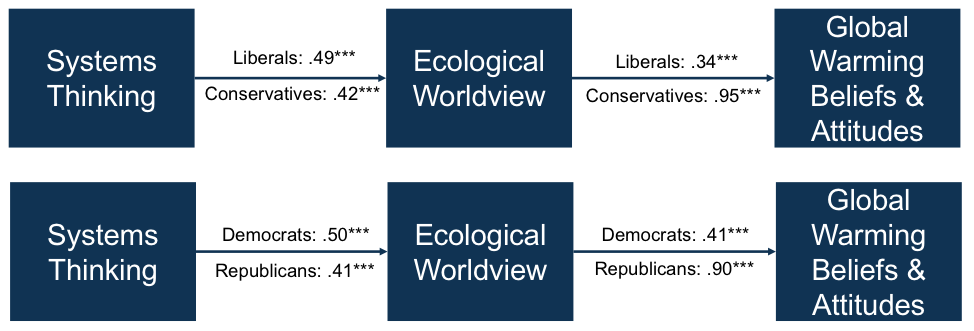Peer-Reviewed Article · Apr 8, 2019
Systems thinking can support public understanding of climate change
By Matthew Ballew, Matthew Goldberg, Seth Rosenthal, Abel Gustafson and Anthony Leiserowitz

We are pleased to announce the publication of a new research article, “Systems thinking as a pathway to global warming beliefs and attitudes through an ecological worldview” in the Proceedings of the National Academy of Sciences.
Systems thinking refers to the tendency to view phenomena as interconnected and dynamic. It involves the understanding that the natural, social, and economic worlds are interrelated and constantly changing, and that people, including oneself, are part of this dynamic system. Although systems thinking is emphasized as vital to learning about and understanding climate science, research on the effects of systems thinking is relatively limited. Understanding how systems thinking influences public understanding of climate change has implications for climate change education and communication.
In this paper, we investigate the relationship between systems thinking and global warming beliefs and attitudes (e.g., belief that it is happening, human-caused, etc.). We also test whether the relationships between systems thinking and global warming beliefs and attitudes are mediated by an ecological worldview. We also examine whether these relationships differ between liberals and conservatives, as well as Democrats and Republicans.
Results
In 2018, we conducted an online survey of U.S. adults (N = 1,058). We found that people who score higher on systems thinking are consistently more likely than those who score lower to understand global warming is happening and human-caused, and to worry about it, view it as a serious threat, value it as a personally important issue, and understand that most climate scientists think human-caused global warming is happening.
While systems thinking is consistently, positively related to global warming beliefs and attitudes, we also found that an ecological worldview explained (mediated) this relationship. These results suggest that systems thinking has an indirect influence on global warming beliefs and attitudes through the adoption of a pro-environmental worldview.
There was also evidence that the pathway is stronger for conservatives compared to liberals, as well as Republicans compared to Democrats. For instance, the combination of systems thinking and ecological worldview more strongly predicted global warming beliefs and attitudes among conservatives (about 37% of variance explained) and Republicans (34%) than among liberals (20%) and Democrats (24%).
Systems Thinking Predicts Global Warming Beliefs and Attitudes through an Ecological Worldview across Political Groups
***p < .001. Measures of global warming beliefs and attitudes were standardized and averaged to form a mean composite. Values refer to unstandardized b-values from separate mediation model tests with each political group: conservatives (n = 269), liberals (n = 316), Republicans (n = 235), and Democrats (n = 343).
These results support efforts to use systems thinking to enhance public understanding of climate science via an ecological worldview that the natural world should be valued and cared for. Climate change represents one of the most complex problems facing society. Enhancing systems thinking in the general public may be one way to promote pro-environmental values and in turn, public understanding of climate change.
The full article is available here and provides more detail on the study and the findings.
Ballew, M. T., Goldberg, M. H., Rosenthal, S. A., Gustafson, A., & Leiserowitz, A. (2019). Systems thinking as a pathway to global warming beliefs and attitudes through an ecological worldview. Proceedings of the National Academy of Sciences. doi: 10.1073/pnas.1819310116
